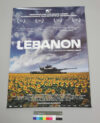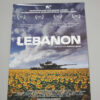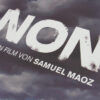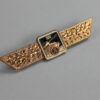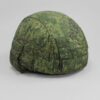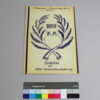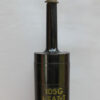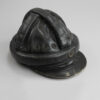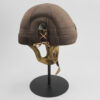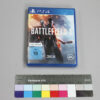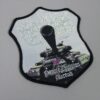Film poster “Lebanon”, 2009
Inventory number: DPM 6.2153
“Lebanon” from 2009 is the first feature film by director Samuel Maoz. In it, he deals with his experiences as a tank gunner during the Lebanon War in 1982. With “Lebanon”, he was the first Israeli director to win the Golden Lion in Venice.
In June 1982, Israel began the invasion of Lebanon with the aim of destroying the operational bases of the Palestine Liberation Organization (PLO). The PLO had repeatedly attacked Israel from Lebanese territory and carried out terrorist attacks. Lebanon itself had already been torn apart for years by a civil war in which the Syrian armed forces were involved.
The film follows the Israeli crew of a Scho’t tank, based on the British Centurion main battle tank, on their first day in the Lebanon war. They accompany paratroopers of the Israeli army and have no combat experience. Their mission is to search a town in Lebanon that has already been bombed by the Israeli air force for enemy combatants. With a few exceptions, the entire film takes place inside the tank. The viewers can only perceive the outside world through the eyes of the gunner and the scenes seem rather disconnected, like flashbacks from memory. The focus is on the claustrophobic war experience in the tank and the emotional conflict of the crew.
A central conflict is dealing with the decision to kill or not to kill and the fear of being killed if you don’t kill. In an interview, the director describes this decision as particularly difficult as a tank soldier. As a pilot, you kill without direct visual contact and as an infantryman you are under direct physical threat, but as an armored soldier you are somewhat protected behind the steel wall, which is why the act of killing is more “calculating” and “cold-blooded”.
One of the first scenes in the film is exemplary of this decision: the crew moves through the area together with the soldiers and a car drives towards them. The gunner cannot bring himself to shoot at the vehicle and the men in the car kill an Israeli soldier. His body is placed in the tank. The gunner fires at the following vehicle without firing any warning shots. However, a civilian is sitting in the vehicle and is severely mutilated. The consequences of his decisions are brought home to the gunner.
The film poster shows the tank in a field of sunflowers. It is one of the few shots not set in the tank and the last scene of the film, in which the crew find themselves after their first day in the war. The horrors experienced that day stand in bizarre contrast to the peaceful and idyllic sunflower field.
The film is part of a series of Israeli films from this period that deal with war in a de-heroizing way and in which personal trauma is at the forefront. “Lebanon” received a predominantly positive response. However, it was criticized for ignoring the political context and thus the question of responsibility for the war, which was also controversial in Israel. Samuel Maoz emphasizes that the film is explicitly about his personal, subjective perspective and his experiences during the war. In addition, he decided to address the audience primarily on an emotional level, for which a stronger localization is unnecessary. Due to the interchangeability of the setting, the film is intended to be a universally valid “anti-war film”.
This text was automatically translated using AI.
Object of the month
(short) stories from the depot
Unfortunately, many objects cannot currently be shown in the exhibition for conservation reasons. Here you will find unusual objects and exciting stories of special pieces from the depot
